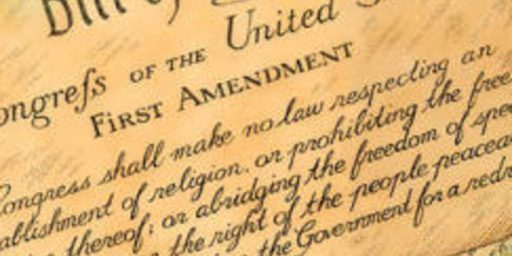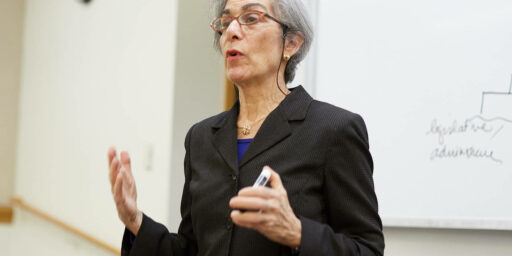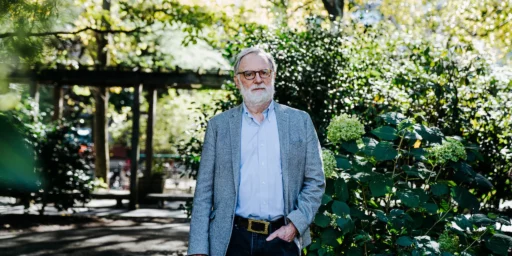How Should Students Address Professors?
The archaic practice of calling one's seniors by titles rather than their first name is actually quite useful.
Professor Harry Brighouse, who teaches philosophy at Wisconsin-Madison, ponders the question, “How should students address professors?” He lets students supply the answers and concludes with this view “from a senior who attends the class (and knows me well):”
I know that I, personally, am very turned off when I walk into a classroom and the professor tells me that we must address him/her as Professor so-and-so. Yes, they have earned a certain amount of respect through their schooling, experience, and assumed knowledge, however it sets a conceited and pompous aura around that person from day one that will be very hard to overcome. My fiance goes to a small private school in which 95% of the teachers would cringe if you DIDN’T call them by their first names. I heard one of them say once that “Learning is an on-going process. Just because I have a few letters before or after my name doesn’t mean I know everything. Any student who walks through my classroom doors has something to offer and we should all treat each other as if we’re on an even playing field, experiencing the process of learning together.” I quoted this statement, because as soon as I heard it, I wrote it down, admiring how well-constructed I felt these thoughts were.
Call me out of touch, but that’s precisely the wrong message for a professor to send to his students on the first day of class. Yes, some of them are very bright and all of them have something they could add to the conversation. And, no, the professor doesn’t know everything; far from it! But they are by no means “on an even playing field.” Indeed, if they were, why the hell is the one fellow getting all the other poor suckers to pay him money for his contribution?!
Furthermore, even if one wishes to consider one’s students equal companions on the road to learning, treating them as colleagues is a cruel joke. The fact of the matter is that, at the end of the term, one of the happy travelers will be assigning a grade that impacts the immediate future of the rest of the merry band. Titles are a subtle reminder of that fact.
In the Army, there was an old saying to the effect that “The commander should never have to think about his rank and the subordinates should never forget it.” My battery and battalion commanders called me by my first name when only officers were in the room. I always addressed them as either “Captain So-and-So” or “Colonel So-and-So” or called them by their mutual nickname, “Sir.” This served multiple purposes, not least of which was a subtle psychological check against saying something that you would later regret.
The exact practice varied at the universities where I attended or taught, with professors usually going by “Dr. So-and-So” or “Professor So-and-So.” In the athletic departments, they were “Coach So-and-So.” In ROTC, “Captain So-and-So” and so forth. In addition to respect for the years of learning that went into earning those titles, it signaled the hierarchy of the group dynamic.
The Old School approach was for professors, in an effort to signal to students that they were no longer kids in high school but young adults, to reciprocate and call their students “Mr. So-and-So” or “Miss So-and-So.” I did that for my first couple semesters teaching but ultimately dropped the practice, since I was only one doing it and it seemed archaic. It’s one of the handful of cases where I long for the Good Old Days, though, as I still think it’s the right idea.







Funniest story my friend, raised on Marine bases, told me was about having to salute the Col’s car (Col’s wife, driving alone).
Whatever grand titles professors may enjoy, it never quite goes that far.
Happily, most of that nonsense ended. I think one still salutes staff cars with general officer insignia, but those are supposed to be displayed only when the general is actually in the car. Otherwise, the only one that salutes cars is the guard at the gate(s) to the base.
I only did 2 years of college and I only had 1 teacher that wanted to be referred to by his title and the experience left me thinking that the man was arrogant and full of himself. All of the other instructors went on a first name basis and the experience was not only friendlier but I felt I got more out of the classes. But that’s only my own personal experience.
Wow, really? I graduated from a large state university less than a year ago, and everyone almost always addressed professors as “Dr. (name)”, and we called them that when we were talking about them outside of class too. Generally, the only people who were addressed by their first name were undergrad TAs or instructors with graduate degrees but not doctorates.
Uh, having been in the Marines, I can tell you, When in doubt, salute is by far the best course of action always.
Running against type here, I’ll agree with you. I miss a degree of formality. (Then again, I’m indirectly tainted by the military mentality having grown up an army brat.) I find when I refer to people as Mr. or Mrs. or Ms., they look at me suspiciously, as though it might be a trick.
In fact I miss that sort of distance in all human relationships. (Well, my wife can call me Michael. An improvement over what she often calls me. But I digress.) I wish people felt less as if they could treat me like a long-lost friend when they barely know my name. Along with a degree of formality should go a certain delicacy and discretion that died with titles.
The use of a title is a constant reminder that there is a decided difference in status between professor and student. That difference is critical, and needs constant reinforcing. The two are not equals, should not be equals, can not be equals, and must not be equals.
J.
Look, Dickweed……….oh, wait a second…….
I have mix experiences and mix feelings on the subject. I have had good and bad experiences doing it both ways. It depends once again on the individuals. To me if a Professor wants to be called Dr. or Professor So-and So then they should call their students Mr. or Miss So-and So . Respect should go both ways. Otherwise they are likely just being pompous. Of course in my major we weren’t too concern with what we called each other since we were too busy talking about mathematics. We also were not that concern about run on sentences and such either. To each their own.
When I first sign up I wasn’t all that fond of saluting and all that in the military. To me a person character and ability was what counted not what position they held. However I found out it usually said more about the soldier who gave the good salutes and acted professionally than it did those that they were saluting.
In law school, the professors called me “Mr H.” And in law school, it’s often better when the professors don’t call you anything at all.
To me if a Professor wants to be called Dr. or Professor So-and So then they should call their students Mr. or Miss So-and So . Respect should go both ways.
Sounds reasonable to me.
In general, I prefer to call people what they want to be called, with the pronunciation they use (to the best of my ability, in some cases). My wife is on a first name basis with my parents but I got subtly rebuffed when trying that with my in-laws. That’s fine – they were born in another country and culture. My neighbors want my little kids to call them “Mr. Ted” and “Mrs. Robin” instead of using their last name. Again, that’s fine – an interesting mix of formal and informal. Similarly, I call Pro-Life people “Pro Life”, not “anti-abortion”, same with “Pro Choice” as opposed to “baby killers” or whatever.
If people are truly pompous, there will be other more valid ways of identifying that personality trait. Using titles in a hierarchical organization, whether it’s military or education, is perfectly reasonable and even desirable.
When in the situation that one person is DEFINITELY in a status of “control” (authority, leadership, what-have you) the use of titles DOES denote and mark that difference.
A college professor has no more “right” to be my “buddy” as my parent does, there is a difference, and when you ignore it, things, (and not good things) happen.
Wayne and Franklin have it right. Respect goes both ways. The professors should also maintain a professional demeanor while on campus.
Dude Why? ? or, Hey teacher leave are kids alone?
When I was in college, just a few short years ago, what the professor preferred to be called depended on your schooling status. When I was a freshman, my Poli Sci 200 prof was “Professor Weinstein.” Three years later, when I was taking one of his graduate classes, he was “Michael.” The relationship had changed from the freshman dynamic of clear authoritative source of knowledge vs. ignorant student, to a more collaborative environment where the gap in knowledge between professor and student was much smaller.